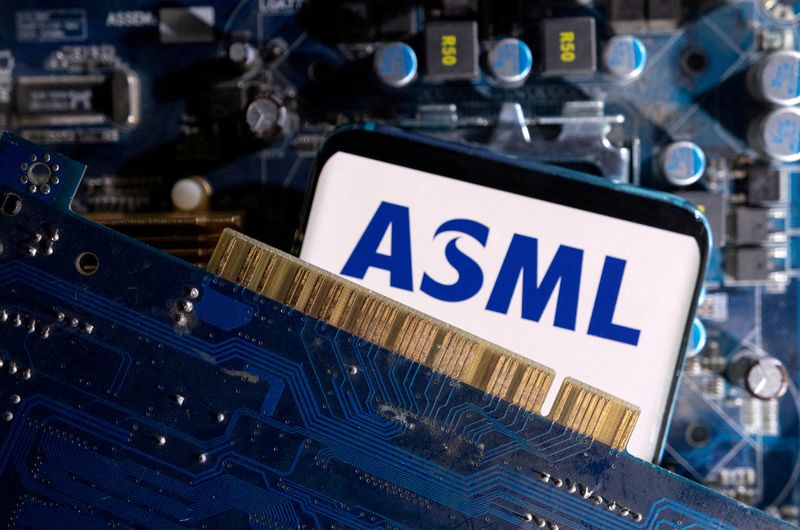By Arsheeya Bajwa
(Reuters) -Wall Street’s semiconductor index lost more than $500 billion in stock market value on Wednesday in its worst session since 2020, after a report showed the United States imposed tighter restrictions on exports of advanced semiconductor technology to China.
Comments from Republican presidential candidate Donald Trump, who says Taiwan, a major manufacturing center, should pay the United States for its defensive selling of chip stocks.
The latest concerns for chip investors come after Washington in recent years has taken a more protective stance toward the U.S. semiconductor industry, which the country sees as strategically important for competing with China.
The United States has told its allies that it will consider imposing the toughest trade restrictions if companies continue to give China access to advanced semiconductor technology, Bloomberg News reported on Tuesday.
U.S.-listed shares of Dutch chipmaker ASML Holding (AS:) fell 13% after the report, even as they beat second-quarter earnings estimates.
AI heavyweight Nvidia (NASDAQ:) fell nearly 7%, losing more than $200 billion in market cap.
Smaller rivals AMD (NASDAQ:) and Arm fell about 10%. Micron (NASDAQ:) fell 6% and Broadcom (NASDAQ:) lost 8%.
Companies with U.S. chip manufacturing operations posted gains, with GlobalFoundries (NASDAQ:) up nearly 7% and Intel (NASDAQ:) up 0.35%. Some analysts believe Intel could benefit from the geopolitical tensions as it builds several factories in the country.
“Market reactions are likely to be short-lived as the fundamentals driving these markets have not changed. Yes, U.S. restrictions on shipments to China will likely increase somewhat — regardless of the outcome of the U.S. election — but they have been in place for a while. while,” said Bob O’Donnell, principal analyst at TECHnalysis Research.
President Joe Biden’s administration has moved aggressively to curb Chinese access to cutting-edge chip technology, including sweeping restrictions issued in October to limit exports of AI processors designed by companies like Nvidia.
The restrictions have hurt U.S. chipmakers’ sales to China. Nvidia’s sales from China were about 18% of total sales in the quarter ended April 28, compared with 66% in the same period a year ago.
Trump, seeking to regain the presidency in the November 5 US elections, told Bloomberg Businessweek that Taiwan should pay the United States for its defense as it gives the country nothing. That caused the US-listed shares of Taiwan’s TSMC – the world’s largest contract chip manufacturer – to fall 8%.
Taiwan plays an outsized role in the global chip supply chain. Analysts have warned that any conflict over the island could destroy the global economy.
The Philadelphia Semiconductor Index fell 6.8% in its biggest single-day decline since the COVID pandemic sent global markets into a tailspin.
The index continues to rise 30% through 2024, outperforming the US index’s 17% gain, thanks to the AI boom.
INTEL CAN PROFIT
Intel has invested heavily to regain the manufacturing lead it lost to TSMC. It is also one of the biggest beneficiaries of the American Chips Act, signed by Biden in August 2022, with $52.7 billion in subsidies.
Several policy experts said the U.S. focus on semiconductors is likely to continue even if Trump returns to power, with possible more restrictions on exports to China and support for domestic chipmakers such as Intel.

But they warned of uncertainty over Intel’s ability to revive its manufacturing business, with the company’s foundry segment posting an operating loss of $2.47 billion for the quarter ended March 30.
“It is likely that President Trump will not only continue but strengthen export restrictions,” said Michael Sobolik, a senior fellow at the American Foreign Policy Council. “During his first administration, he initiated many export controls on semiconductors, including the strong ‘foreign direct product rule’ that prevented foreign parties from giving Huawei access to semiconductors.”


